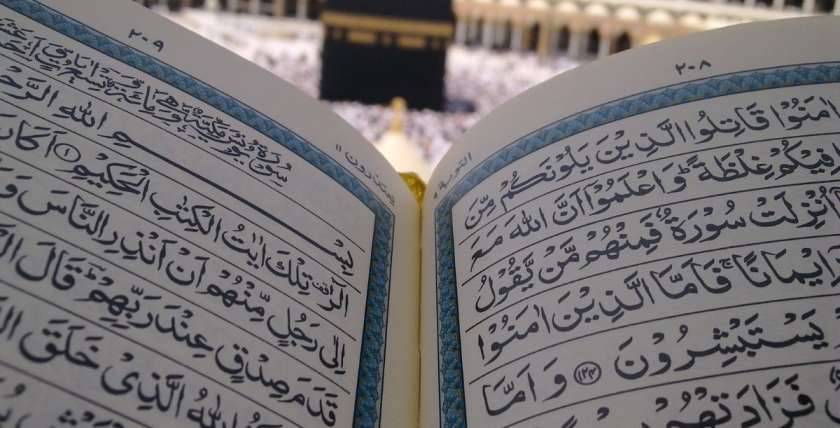We know that there are times of the day when prayer is forbidden. Does that mean that there are Forbidden Times to read the Quran? Well, let’s find out.
Is there a Forbidden time to read the Quran? No, there are no forbidden times to read Quran, Dua, or Azkar. You can do any kind of worshipping Allah at any time. Forbidden times only apply to prayer. And sometimes you have no other choice than to pray during that time; or you’re going to miss the prayer.
Let’s explain this a bit more:
Forbidden Times to Read the Quran

Instead of forbidden times to read Quran, there are best times to read Quran and they are:
1- Fajar Time:
One of the best times to read the Quran is Fajr. It was mentioned in the Quran. Because it is the time of day when the angels come to see what everyone is doing; and who is awake to worship Allah. Isn’t it great to be one of the few people who wake up at Fajr; just to worship Allah and recite the Quran?
2- Reciting Quran at mid-night:
Another great time of the day to read the Quran and worship Allah is midnight. Being alone with no distractions. In the calmness of the night reciting the verses of the holy Quran. Understanding every verse and word that you read.
That’s how we should read the Quran in a calm environment; to be able to focus on what we are reading instead of just reading to finish our daily reading.
3- On Friday:
One of the favorite days to Allah is Friday. So reading the holy Quran at any time on Friday is something you shouldn’t miss. So, be sure to read Quran every Friday.
Now let’s find out more about Zawal’s time and the scholar’s opinion regarding the forbidden times to read Quran.
Is it prohibited to read Quran at the Zawal time?
No, it is not forbidden, reading Quran during Zawal time is allowed. What is not allowed is performing prayers whether Fard or Nafl, they are both prohibited. But you should recite the Quran and also read Azkar.
Can you read Quran between Fajr and sunrise?
Yes, you can read Quran after the Fajr prayer, it was narrated that the Prophet (peace and blessing be upon him) said: “Whoever prays Fajr in Jamaa’ah, then sits and remembers Allaah until the sun comes up, then prays two rak’ahs, will have a reward like that of Hajj and ‘Umrah.”
So it’s not a forbidden time on the contrary it is one of the best times to read the Quran.
Is sujood al-tilaawah considered to be prayer?
One of the things done during Quran recitation is sujood al-Tilaawah (prostration during the recitation of the Quran). Some people say that it is forbidden to read Quran during Zawal time because prostration during the recitation of the Quran is considered prayer, but that’s not correct.
Prayer includes Takbeer and Tasleem while sujood al-Tilaawah doesn’t so it’s not considered a prayer. Takbeer is saying “Allaahu Akbar” at the beginning of prayer, and Tasleem is saying salaams, as at the end of the prayer.
The hadiths regarding the prostration during the recitation of the Quran don’t indicate anything about the prostration during reading the Quran being a prayer. Here’s one of the hadiths: “he prostrated and we prostrated with him”
There is a hadith that refers to saying the Takbeer during sujood al-Tilaawah narrated by Abu Dawood (“he said ‘Allaahu Akbar when he prostrated”. But the hadith didn’t indicate that there was any Tasleem after sujood Tilaawah al-Quran.
No Tasleem;
As long as there are no Tasleem then it’s not considered a prayer, because prayers begin with Takbeer and end with Tasleem.
Based on the view of Shaykh al-Islam Ibn Taymiyah you can prostrate even if you are not in the state of Wudu and you don’t have to face the Qiblah. So, when you read the Holy Quran from the smartphone or recite it from memory then it is okay to prostrate even if you are not in the state of Wudu. And this shows us that sujood al-Tilaawah is not considered a prayer. Thus, it’s not forbidden to read Quran at Fajr or Zawal time.
Furthermore, reading Quran After Fajr is mustahabb and you can do sujood al-Tilaawah even during the Zawal time. When Shaykh Ibn Baaz was asked about this matter his answer was:
“It is prescribed to do sujood al-Tilaawah after Fajr and after ‘Asr, because this is something that is done for a reason, and because it does not come under the rulings of prayer according to the more correct of the two scholarly views. Rather it comes under the ruling of reading the Quran and saying Tasbeeh (“Subhan Allaah”) and Tahleel (“Laa Ilaaha ill-Allaah”), so it is permissible for the one who is reading the Quran to do sujood al-Tilaawah, even if he does not have wudu, according to the more correct of the two scholarly opinions.”
Is it forbidden to read Quran and supplicate at midday or midnight?
No, it’s not forbidden, you can read Quran and supplication at any time of the day even at the forbidden prayer times. There is no hadith that prohibits reading Quran or Dua at any time.
You can only find hadiths that prohibit praying at specific times of the day.
There is a hadith narrated by ‘Uqbah Ibn ‘Aamir Al-Juhani who said: “There are three times at which Allaah’s Messenger ( peace and blessing be upon him ) forbade us to pray or to bury our dead: when the sun begins to rise until it is fully up [about 15 minutes after sunrise] when the sun is at its zenith [at midday] until it passes the meridian, and when the sun draws near to setting until it sets.” [Muslim]
Additionally, Abu Sa’eed narrated that the prophet (peace and blessing be upon him) said: “There is no prayer after performing ‘Asr prayer until the sun sets, and there is no prayer after performing Fajr prayer until the sun (sufficiently) rises.” [Al-Bukhari and Muslim]
The prophet said:
“Pray the morning (Fajr) prayer, and then abstain from prayer until sunrise and the sun has completely risen, for it rises between the horns of Shaitaan. That is when the unbelievers prostrate to it. Then pray (Nawafil), as your prayer will be witnessed and attended to until the shadow of a spear becomes less than its length. At that time stop praying, for at that time (Zawal) the Hell-Fire is fed with fuel. When the shade comes, you may pray (dhuhr), for your prayer will be witnessed and attended (to by Angels) until you pray the afternoon (Asr) prayer. Then abstain from praying until the sun sets, for its sets between the horns of Shaitaan, and that is when the unbelievers make prostrations to it.”
According to Abu Huraira, Allah’s Prophet said:
“There is for every Salah, its initial and final time. The initial time for Zuhr is when the sun declines and its final time is when Asr commences. Initial time of Asr is when it sets in till when the sun turns yellow. The initial time of Maghrib is with sunset and its last is when redness on the horizon disappears. Initial time of Isha is from then and its final time is at midnight. The initial time of Fajr is from dawn till sunrise.”
As you can see there are no hadith forbidding us from reading the Holy Quran or Duas during the day, which indicates that we can read Quran at any time we like.
Now if you still have any questions visit our website, QuranOnline.com and you will find all you need.







Comment
Muhammad Alhassan
Mashaa Allah. The answers are very apt and succinct. May Allah reward you with jannahtul firdaus
Rizwana
Awesome